Before we begin…
If this is your first introduction to CFI’s Essential Knowledge for the New Shooter series, go back now and read what you’ve missed starting with:
Part 1 – Firearms 101
First, the opening to every Essential Knowledge for the New Shooter Post:
You’re starting out, you don’t even know what it is that you don’t know yet.
No worries. I’ve got you covered
Getting into guns is a huge undertaking when you start to think about it. If you want to do it the right way, it can seem like there are a million things to consider before you even get started.
The first time I talk to new students, they’re thinking things like:
“I don’t even know anything about guns”
“I don’t understand half the stuff I’m reading about them.”
“Where do I even go to shoot them or try them or learn more?”
“Do I need a special license to shoot or something?”
“I don’t have any gun friends to ask about this stuff, what are good companies?”
Essential Knowledge for the New Shooter will get you pointed in the right direction in the important areas you need to know about right now and you can continue your learning at your leisure.

You don’t need an encyclopedic knowledge of all things “gun” to be a safe and efficient handgun shooter. You definitely don’t need it when you’re just starting down the road beginning to take a look at guns.
What you do need is the foundation of the right basics to get you started. That’s what we’re talking about here today.
Let’s start with the Top 5 Categories of Firearm Knowledge you need right now:
“Guns 101” – How they work and what “kinds” there are.
Gun “lingo” – How do I “speak gun” and understand what I’m reading here?
Gun Laws – Where to get the best information on the legal side of things.
Range Basics – What to look for, where to go, what to ask, and how to find them in the first place.
Gun Companies – If someone asked me to list all of the car companies when I was 16 buying my first car (or to this day, for that matter) I would be at a loss! Use our list to navigate your way through the noise, using the information you’ll learn here to find the gun that’s perfect for you.
This will not be a very deep dive into any of these topics!
Put away the pen and paper and simply read and absorb. Bookmark this post and come back to it to use all the links and information herein whenever you get the time.
This is not going to be something that you will completely absorb the first time around, trust me. I’ve picked these topics to introduce now for that exact reason.
You’re getting yourself ahead of the gun-game here.
When you’re done, you will be set and ready to start taking your first steps towards heading out to the range armed with all the information you need to start making choices towards finding and shooting your ideal handgun. (Pun very much intended.)
So let’s get started with Essential Knowledge for the New Shooter, Part 2 – Gun Lingo, Gun Laws, Where to Shoot, and Handgun Companies You Need to Know!
GUN LINGO
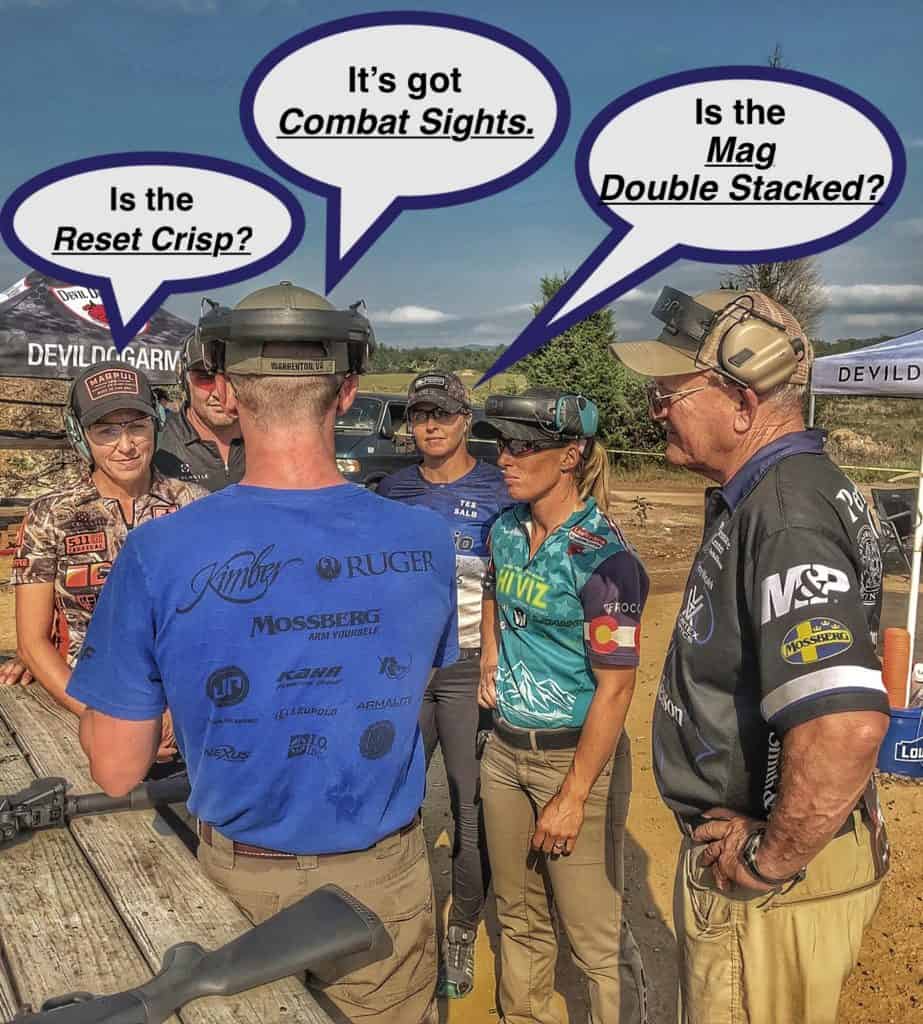
“I want to learn about all this the right way but I don’t understand half of what I’m reading and hearing when I’m trying to learn. What do I do?”
If you went to a foreign country, you’d be smart to brush up on the language before you go in case you need to ask directions, get some assistance, or communicate without sounding like a complete moron.
Think of the “shooting world” as a foreign country. Most of the people don’t make sense when they’re talking, the customs are all somewhat strange to you, and you get funny looks when you try to communicate in your own language half the time.
The good news is two-fold.
One – You’ve got this blog, this post, and CFI’s “Survival Gun-Talk” Guide.
Two – The “gun world” is populated with some of the kindest, most respectful people eager to help a new shooter in any way that they can.
Provided you do not commit the mortal sins of being either:
1. Knowingly unsafe.
OR
2. A jerk who pretends to know more than they do, wasting everyone’s time.
To learn the language quick, get your free copy of CFI’s “Survival Gun-Talk” Guide here when you’re done reading this post. You will find just about every “gun-term” you will need. We’re always growing and improving our list to find the stragglers you need and we didn’t get!
This list will make sure you’ve got the terms you need handy for you to reference in plain english. Everything from common “gun range jargon” to industry-specific handgun terms in easy-to-understand common language.
The next best thing you can do for yourself is ask questions constantly.
Your best bet to learn is to ask questions when you hear something you don’t understand. There’s nothing wrong with not knowing!
“There’s nothing inherently wrong with ignorance, provided it’s not willful and avoidable, and provided you strive to change it once the condition has been noticed.”
– Anonymous
Conclusion:
Get the “Survival Gun-Talk” Guide, keep your ears open, ask questions, and you will be well on your way to translating all the new lingo you’re hearing with ease. If you have any questions, comments, or new phrases you think should be added to the Guide, reach out! We’re always excited to hear from you and will most likely add your suggestion to the next edition if we haven’t already done so.
Now that you’re set to learn how to speak the language of this fascinating new land you’re in, let’s get to know the law of the land.
GUN LAWS
“Alright I know how to talk guns now, so do I go get a license to go to the range? Where do I get my permit to keep the gun in the house? I’ve got kids, is it illegal to have a gun around them?”
Take me seriously when I say the following, which I’m sure you’ve heard from just about everyone who’s ever spoken on the subject:
I AM NOT A LAWYER, DO NOT INTERPRET ANYTHING I AM SAYING AS WHOLESALE LEGAL ADVICE TO TAKE TO COURT.
This is all best practice based on my knowledge and experience. If you plan to carry concealed I would recommend consulting a lawyer and considering an insurance provider like NRA Carry Guard or USCCA.
These companies specialize in self-defense, firearm, and second amendment law. They offer legal training, counsel, and insurance for people who choose to carry firearms for self defense.
“If I go ahead and get the insurance, aren’t I covered? Why mess with learning more legal stuff?“
Gun laws are different from state to state, and even as much as from county to county. You’ll be astonished by the ways they vary. You need to find a source to keep up to date with all of the latest “goings-on” when it comes to the laws in your state, because ultimately YOU are the one responsible for knowing and following all the laws, no matter how ridiculous they seem.
The following are a couple of reputable sources where you can go to look at what’s happening.
(Not that your shooting buddy isn’t a brilliant legal mind and all, but best to just double check with the experts.)
None of these are a substitute for seeking legal counsel for specific questions. However, since none of us have time to meet with our lawyer every single day, these will be good ways to do your best to stay as informed as possible.
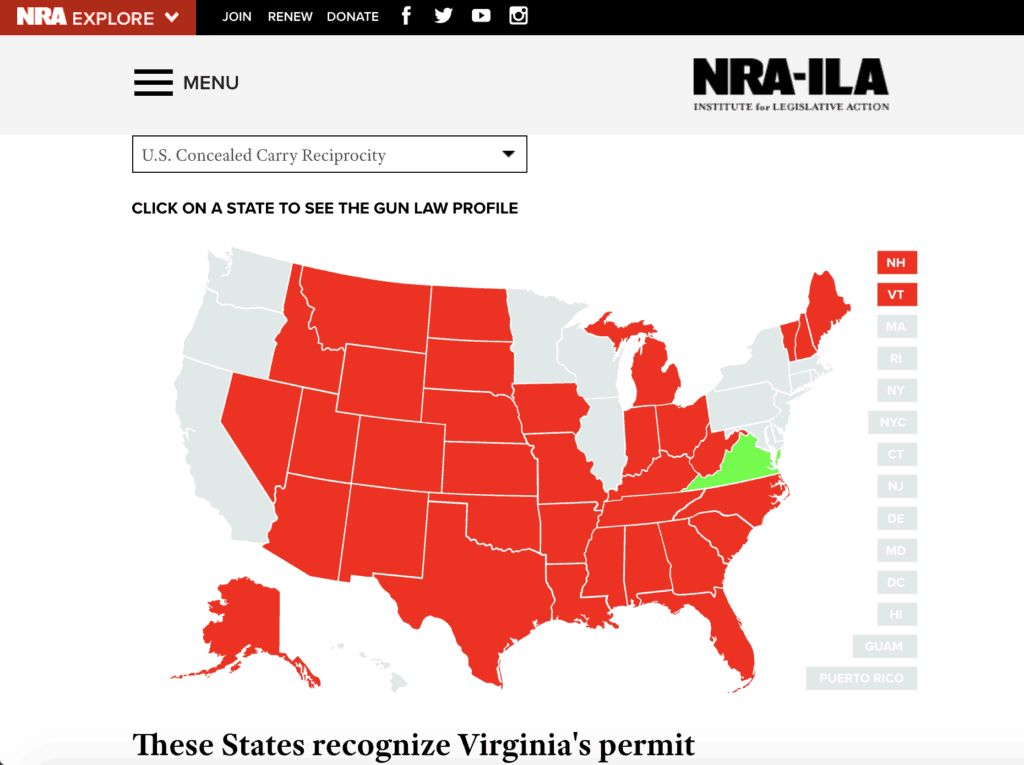
NRA ILA – https://www.nraila.org/ – I would use this website for their excellent information on Concealed carry and handgun laws from state to state. It’s a great tool to get a quick overview of the laws no matter where you find yourself in the country. I would recommend signing up for their emails as well.
I know, I know, the NRA is notorious for sending you a ton of emails asking for money and telling you about everything under the sun in the gun world. Believe me, I know. That being said, I still believe having the up-to-date information about gun laws coming down the pike is well worth the extra few emails.
Be sure to check out their state map for concealed carry (pictured above) while you’re there. It breaks down which states honor which other state’s Concealed Carry Permits, and which do not. You will be surprised how often legislatures seem to change their mind about who’s allowed to carry firearms in their state, and you do not want to be caught unaware out of state breaking a law having to do with a firearm.
NRA ILA also has an App. I have not personally used it to a great extent, but it has 4.5 stars with over 1,000 ratings as of me writing this, so it seems to work well. You can find it here.

Legal Heat – https://mylegalheat.com/ – This is an app to put on your phone. If that sentence already has you lost, then this most likely isn’t the avenue for you. For those of you who are still with me, this application is pretty great. It’s constantly updated with comprehensive concealed/open carry laws for each state. Everything is written in fairly plain English by legal professionals. Great for use if you will be traveling outside of your state and need to check the legal status of bringing your firearm with you and much more.
Now, the last part of this is going to be controversial, I’m sure. Allow me to preface it by saying the following:
I work at a gun shop and range staffed with incredible and knowledgeable people who would give you better firearm information and advice than you could hope to find just about anywhere else.
That being said, even the best staff at the best gun shops are not lawyers. They are not paid gross sums of money every year to stay up to date on the nuances of our legal system. I would not recommend going to your local gun shop for legal advice.
Any honest employee of a gun store would agree with me.
Conclusion – You need good legal advice. Many ranges and gun clubs will offer classes on your state’s firearm and self-defense laws, I would attend one if I were you. Speak with a lawyer if you have a particular question, and go to the above listed sites to stay current day-to-day.
Range Basics
“Ok, I learned the lingo, I know about guns, I’m keeping current on the laws, let’s go shoot something.”
BEFORE YOU EVEN ASK, for the most part, the answer is NO, you cannot just go into your back yard and shoot your awesome new gun.
Unless you’re lucky enough to live on your own large plot of land and have checked your zoning & firearm laws, shooting on your own land most likely isn’t an option for you.
That means you have to go find a range.
What’s a shooting range anyway?
A shooting range is any location where the proper facilities and safety precautions have been put in place to allow people to fire certain guns safely and legally. Most often these are businesses or clubs.
Ranges can either be:
- Public – Anyone who pays to be there is welcome. Many times you will find there is a fee charged to shoot on one of their lanes, or they will have you buy their ammunition to shoot on their range, so on and so forth.
- Private – You must be a member to shoot there.
Public Range Pros:
- Anyone is welcome.
- You don’t have to commit to a membership fee if you don’t end up liking the sport.
- Many have rental guns available for you to try.
- Often times you will find them to be slightly more relaxed and less intimidating than a private range.
Public Range Cons:
- Anyone is welcome. This unfortunately includes the bad with the good. New and inexperienced shooters (who aren’t taking the time to learn like you are) will show up on public ranges without proper safety training. (You can help yourself to what I’m sure are dozens of youtube videos showing just how idiotic people can be on the range.)
- No guaranteed place to shoot. While private ranges purposefully keep membership numbers at a manageable level, a public range may be wide open for you one day, and then the next there will be a line out the door and no place for you to shoot for hours.
Ranges can also either be:
- Indoors – Exactly what it sounds like. Lanes with benches or tables, usually separated by some kind of barricade with a long corridor leading a specified distance from the shooting line. Typically equipped with electronic target retrieval systems so the shooter doesn’t have to move from their shooting spot to check or change targets.
- Outdoors – Outdoor ranges vary much more than indoor ranges. They can be anything from massive facilities on acres and acres, to something that looks like half of a pit carved into someone’s backyard, to anything in between. *Be sure to check reviews and photos!* They will usually have you in charge of placing/changing your own targets. They will usually operate on a range hot / range cold basis to allow shooters to go downrange and change their targets when they need to while no one is handling any firearms.
Indoor Range Pros:
- You don’t need to move to go get your targets or wait on a “cease-fire” to check your progress up close.
- You’re kept out of the weather.
- More control over the distance which you shoot (many outdoor ranges will have set berms and racks from which you hang targets, while indoor ranges let you pick the distance you shoot down to the foot/yard with a switch or keypad.)
Outdoor Range Pros:
- The elements – Besides the fact that a beautiful day outdoors is scientifically good for you and many people enjoy it, even the poor elements can be an added challenge to augment your training which many higher level shooters take advantage of. I wholeheartedly recommend that if you plan to carry a firearm concealed, that you try your best to incorporate less-than-ideal conditions into your training at least now and again.
- Longer distance. Though not every outdoor range will necessarily be further than every indoor range, when you want to do long distance shooting with a rifle especially, you’re not doing it at an indoor range, they simply don’t have mile-long indoor ranges.
- Less noise (typically) – Try as they might at indoor ranges, at the end of the day technology can only do so much to change the fact that you’re in an enclosed space with 10-100 guns all going off at the same time. Outdoor ranges allow the noise to disperse much better, allowing for easier conversation/instruction/etc. *It is still loud, and you still need hearing protection, don’t get me wrong here! Simply not as loud as an indoor range.
Finally, without getting into too many details, certain ranges are set up to only allow 1 type of gun or another.
- Shotgun only
- Pistol Only
- Rifle Only
- All of the above or any combination
“But Chris, why would a place tell you that you can shoot one gun, but not another? Isn’t a shooting range just a shooting range?”
A lot of times a facility will limit what guns you can shoot based on their size limitations. If a shooting range only goes out to 25 yards, it is likely that they will be a “pistol-only” operation, how would you be able to (and why would you want to) safely shoot your long rifle at a distance of 25 yards? Ranges (more often indoor, but not always) may also limit what caliber (size ammunition) you’re allowed to shoot based on the quality of the protective barriers they were able to procure when they built their range.
So while you’re taking the time to learn about guns and shooting, take the time to learn about your local ranges.
If you get the following questions answered about a potential shooting range before you hit the road, you’ll skip the first-time jitters so many people deal with when they step foot on the range, and just be able to enjoy yourself.
- Are they public or private?
- What types of firearms can you shoot there?
- What distance does their range go out to? (You’ll want at least 7 yards for pistol and 50 yards for rifle in most cases.)
- Do they have a Range Safety Officer (sometimes called “RSO” or “RO”) on duty?
- Are there caliber restrictions?
- What are the costs associated with shooting there? (lane rentals, ammunition cost, etc.)
- Do they have guns that you can rent/loan?
- Do they have protective gear (ear and eye protection) available for rent/loan?
- Can you buy targets there or do you have to bring your own?
- Can you reserve a lane/do you have to reserve a lane, or is it first come, first serve?
Keep all that in mind and you’ll be golden. Be sure to check out www.wheretoshoot.org for a comprehensive list of ranges near you to get your search started.
OKAY! YOU’VE STUCK WITH ME FOR A GOOD LONG WHILE HERE, ONE MORE PORTION TO GO AND YOU’LL HAVE ALL THE STARTER INFORMATION YOU’LL NEED TO THINK ABOUT MOVING FORWARD!
The gun companies every handgun shooter should know.
This part of the post is sponsored by: ABSOLUTELY NO ONE
Before we get into another word, let me tell you this 100% honestly. As of the day I’m writing this on 01/19/2019 I am not endorsed by, nor am I partnered with any: firearms, gear, or ammunition production company whatsoever. No one is paying for my opinion or what I tell you in any way shape or form. No one can buy my opinion from me if it is not what I truly believe about a product (though I wouldn’t want to dissuade anyone from giving it their best shot, my bank account will thank you.)
I would sooner return money to a company than tell someone I believe in a product that I do not. If there is ever a time in the future that I have an affiliation with a company, they STILL will not get a good word out of me that I do not mean, but I will be as up front as I can possibly be with anyone reading what I say about the product that I work with the company that makes it.
“So Chris, if the point isn’t to send me to some company you work with, then what is it?” You ask.
The point is this:
Imagine you ask your friend about cars, you’re looking at buying a new car next month and want some advice. You wouldn’t expect him to answer you, just to find out later that he didn’t even know that Chevrolet and Honda existed!
This, however, happens all the time in the gun community.
If you go and ask 20 different people what the best gun company is, you will likely get 15 different answers and you may just start a fistfight in the process. Many of these people who so forcefully defended their company are completely ignorant about not only the offerings, but the existence of so many other gun companies out there.
I’m talking about mainstream ones too!
I’ve put together the following list for you to have and reference moving forward. Not for you to memorize today, and not to confuse or overwhelm you. You have this so that no matter what Google’s algorithms decide to show you on any given day when you type “good handgun company” into the search box, you’ll have this list to refer back to whenever you need it.
This is by no means an exhaustive list of every single group of people who have ever manufactured a firearm in the last few centuries.
This is a list of companies who’s firearms I have personally owned or fired, or who’s guns I’ve trained students to use, or that I have seen in action on a regular basis. They are in no particular order of quality or relevance, (I’ve listed them alphabetically.) These are your basic, staple companies for handguns.
At the end of the day, it’s a good idea to get advice from a professional in-person before you make an informed choice, but use this list to start, and to refer back to while you’re doing your homework.
NOTE: DO NOT read anything into me mentioning, or not mentioning, a few thoughts on any company on this list. My goal is always to give you the best advice and arm you with the most information I can. If I think a tidbit about a company is worth mentioning and is verified by personal experience, I will write it in. If there is nothing mentioned, that is not in any way, shape, or form, an indictment of the company by myself or anyone at Cobalt Firearm Instruction.
Beretta – https://www.berettausa.com/en-us/
- 92 is a good series of handguns. Accurate and reliable. Used by the military for a very long time.
Bersa – https://bersa.eagleimportsinc.com
- The “thunder” is a good option for someone looking for a compact, reliable, lower cost .380.
Browning – https://www.browning.com
Canik – http://www.canikusa.com
- Recently shot a few in competition and was very impressed. I have not owned any for a length of time and can’t speak to ruggedness or reliability long-term, but in terms of performance, they gave a solid showing.
CZ – https://cz-usa.com
- Find a friend who owns one, ask them about it, sit back and enjoy what may very well be a 2 hour conversation. Very well reviewed, very accurate handguns overall.
Colt – https://www.colt.com
- 1911 heaven (as are a few companies on this list.)
FN Herstal (often referred to as simply “FN”) – https://fnamerica.com
Glock – https://us.glock.com
- Do not let the obnoxious fanboys or the ridiculous haters deter you from giving Glock a look. They are not by any means the only functioning handguns on the planet (as some would have you believe), but they are tough, reliable, functional, reasonably priced, and good all around firearms with a lot of aftermarket options (there will be many-an-article about my thoughts on upgrading your firearms down the road.)
Heckler & Koch (often referred to as simply “HK” or “H and K”) – https://hk-usa.com
- I never turn down the opportunity to get my hands on a VP-9 and fire a few rounds. A beautiful striker-fire pistol with a lot of interchangeability and good ergonomics.
Hi-Point – https://www.hi-pointfirearms.com/about-hi-point-firearms/about-hi-point-firearms.php
Kahr – https://www.kahr.com
- The company put on one heck of a course at the ’18 NRA World shooting championships featuring a few impressive firearms. I’ve had limited interaction with their handguns but enjoyed shooting what I did. They make a reasonably priced mainstream product with some interesting options for deep concealment.
Kel-tec – https://www.keltecweapons.com
Kimber – https://www.kimberamerica.com
Magnum Research – https://www.magnumresearch.com
North American Arms – https://northamericanarms.com
Remington – https://www.remington.com
- Recently came out with a new line of double stack 1911s that I have yet to test but am excited to get my hands on.
Rock Island Armory – https://armscor.com/firearms/ria/
- They say it pretty well in their own copywriting: “right on target, right on the price” very affordable firearms and I’ve personally shot extremely well with their 1911 platforms. Good option for someone looking for a solid, but more price-conscious choice for a 1911.
Ruger – https://ruger.com
- A company that has been coming into it’s own lately when it comes to centerfire semi-automatic pistols, with their LC9s often making people’s “top choice for concealed carry handgun” lists. Reasonably priced brand.
Smith and Wesson – https://www.smith-wesson.com
- I’ll just say that there is a reason that the “Shield” is near the top of many “top choice for concealed carry handgun” lists and I personally have been responsible for the sale of dozens of their newer .380 EZ slide to both guys and gals looking for an easy-to-manipulate firearm to carry.
Sig Sauer (often referred to as simply “sig”) – https://www.sigsauer.com
- I’m biased here as I grew up learning how to shoot with a Sig. I personally love them. If you talk to someone about Sig nowadays you may hear things about their issues with the “drop-test” when their 320 was adopted by the military, or their slightly higher price point, both of which are true. Neither of these points, in my opinion, outweigh their consistent quality over the years. Overall, all biases aside, no one will argue that they make a very quality firearm.
Springfield Armory – https://www.springfield-armory.com
- While not one of their most popular models, the newer XDE has been well received by myself and a number of my students. A good option for someone looking for an easy-to-manipulate firearm with a hammer and the option to carry concealed.
Taurus – https://www.taurususa.com/pistols.cfm
Walther – https://www.waltherarms.com/#
- Another company, like Ruger, that I’m giving a much closer look at these days. From their PPS m2 to the CCP models, to their PPQ if you’re looking for a full sized semi automatic pistol with great ergonomics and a wonderful trigger, Walther has been consistently impressing me as of late.
There are of course, specialty manufacturers like Dan Wesson, Carolina Arms Group, and Les Baer out there who make magnificent firearms. They, however, are companies designed for seasoned shooters who know exactly what they’re looking for and are willing to pay a couple thousand dollars to get it. As such, I did not add them to this list, but that is not to say that they don’t make incredible pistols.
Conclusion
You have a lot to learn and this is your best place to start now.
Learn the language so you can understand what you’re learning. Next, tackle the main issues: what is a gun, how do I find out more, where can I shoot it and what do I need to know about those places? Start getting yourself acquainted with the laws regarding owning and shooting a gun in your state. With this information in your back pocket, you’ll be way ahead of the game as you move forward.
This was a lot of information, take some time and come back to it. Tackle it in chunks if that floats your boat, but keep it handy for reference.
As always, Stay Smart, Stay Safe, and Never Stop Improving.

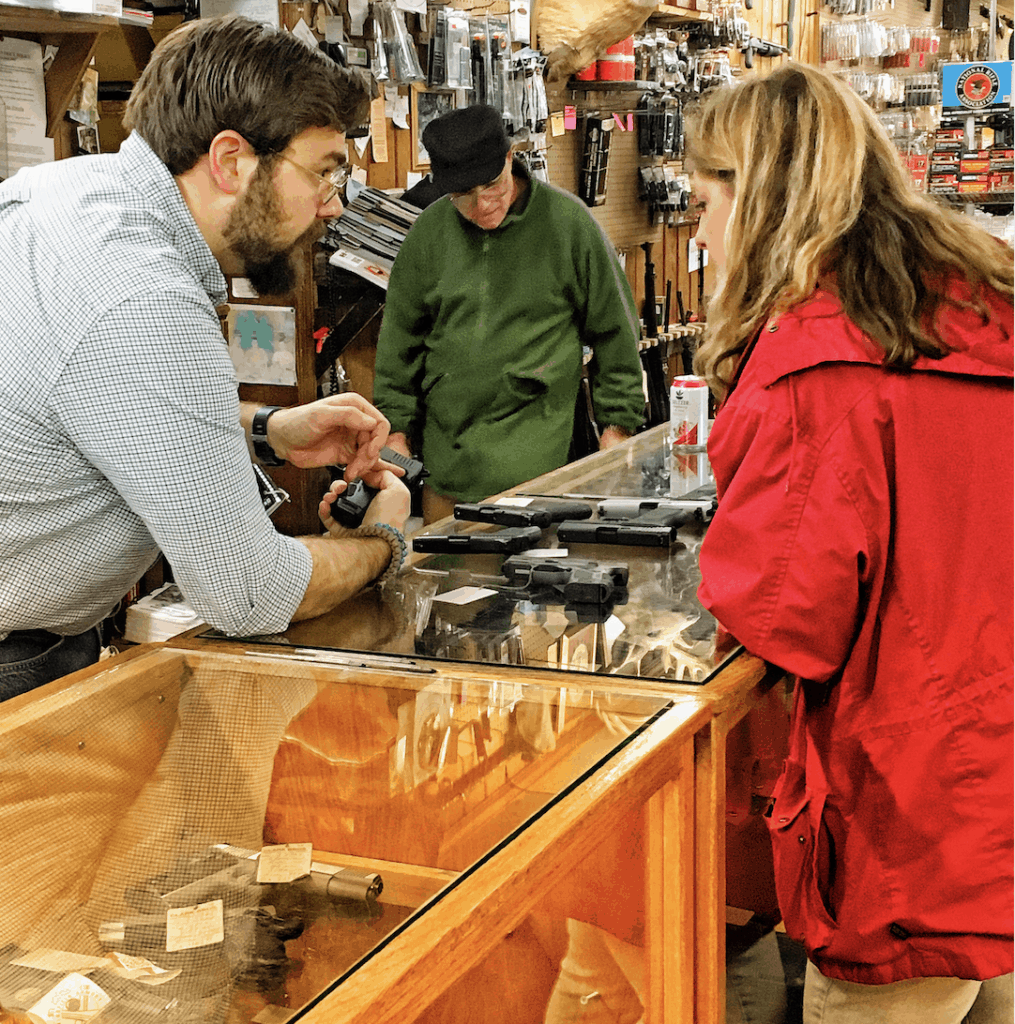
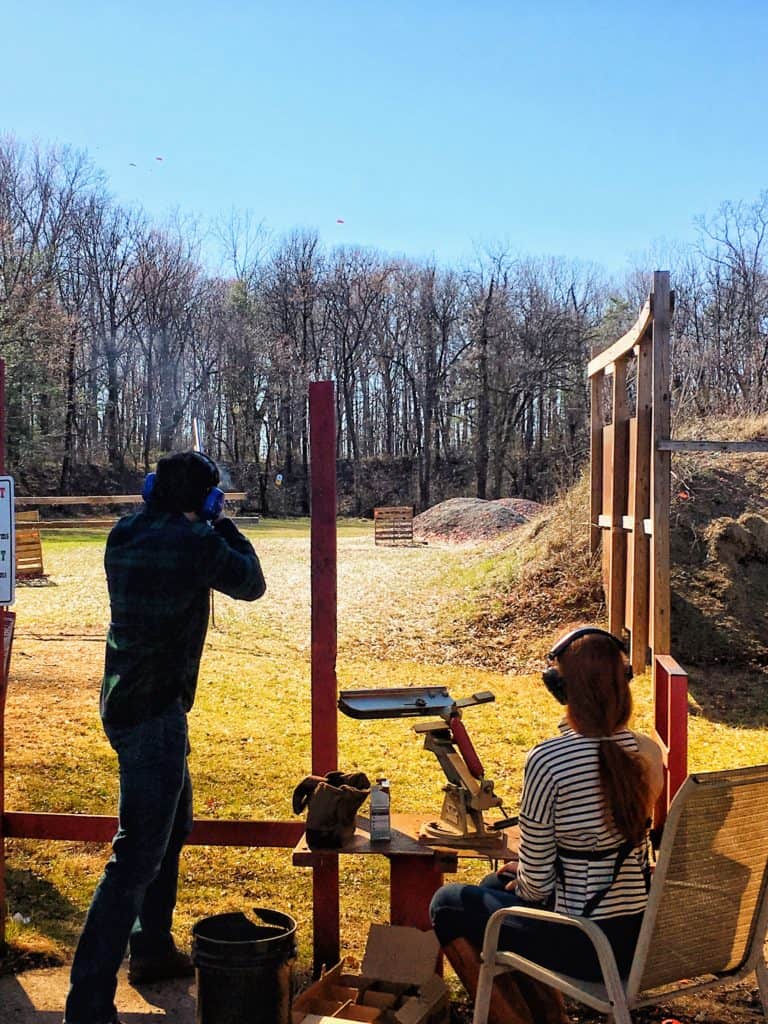
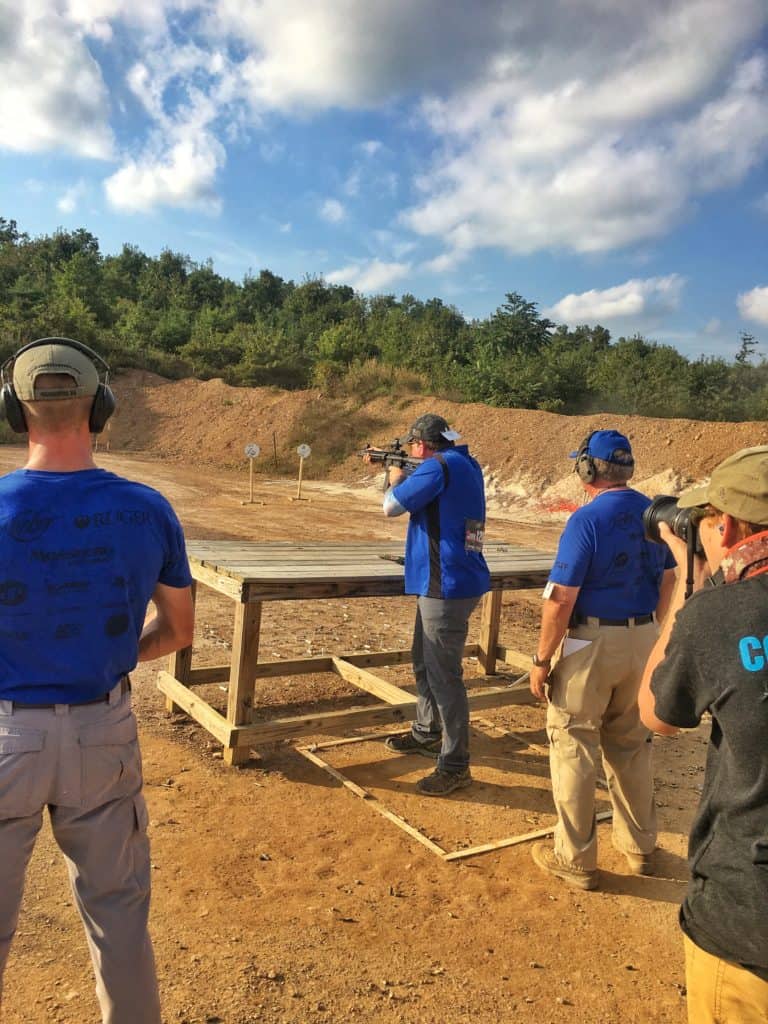
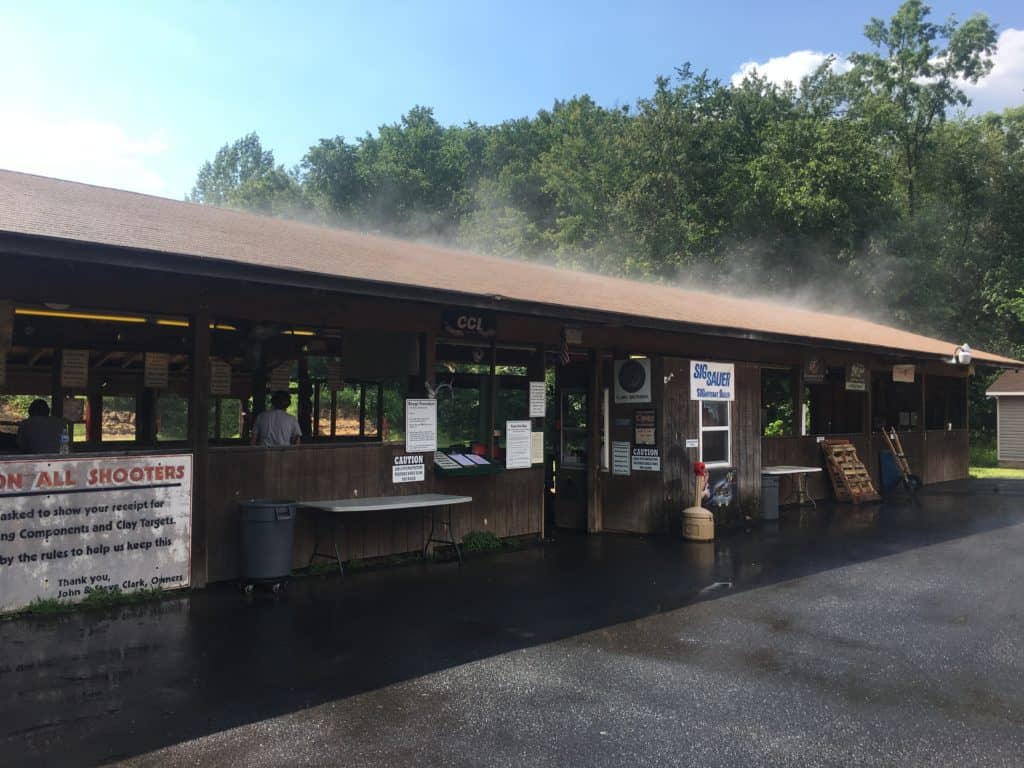
Pingback: How to Find The Right Gun Shop & Range » Cobalt Firearm Instruction